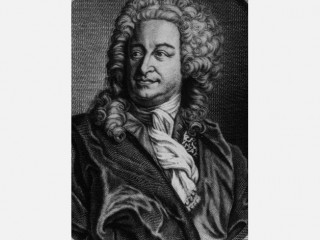
Christian Wolff biography
Date of birth : 1679-01-24
Date of death : 1754-04-09
Birthplace : Breslau, Silesia
Nationality : German
Category : Famous Figures
Last modified : 2011-01-14
Credited as : Philosopher, ,
The German philosopher Baron Christian von Wolff systematized the doctrines of Leibniz. He is best known for his broad concept of philosophy.
Christian von Wolff was born in Breslau, Silesia, on Jan. 24, 1679. His father, a tanner, vowed that his son would enter the Lutheran ministry. At the University of Jena, Wolff studied theology but found that he was more interested in mathematics, physics, and philosophy. He took a master of arts degree at the University of Leipzig, where he taught from 1703 to 1706. He wrote a paper on universal practical philosophy, which he submitted to Gottfried Wilhelm von Leibniz, and on the strength of Leibniz's recommendation Wolff was appointed professor of mathematics at Halle in 1706. He remained there until 1723, when Frederick William I expelled him from Prussia for anti-Pietist teachings.
Wolff then taught at the University of Marburg, where he continued to publish various sections of his unified and deductive system of all branches of human knowledge. His productivity can be gauged by the fact that the collected edition of his major works fills 26 volumes. With the accession of Fredrick II (the Great) in 1740, Wolff was recalled in triumph to Halle. He was honored as professor, vice-chancellor, and finally chancellor of the university (1743). He died at Halle on April 9, 1754.
Wolff was well acquainted with the major developments of modern science and philosophy. He met and corresponded with Leibniz, and, like his mentor, Wolff knew ancient philosophy as well as the Roman Catholic and Protestant traditions of scholasticism. His aim was to systematically organize all knowledge in terms of logical deductions from first principles.
The metaphysics of this endeavor was Leibnizian in origin: the principles of identity and sufficient reason. Wolff believed that every idea or concept expresses a possibility. That some possibilities are actualized is a matter of historical fact. Thus the role of sensation and experience in general is historical. The transition from historical knowledge to philosophical knowledge is the difference between "the bare knowledge, the fact" and the reason for this fact. Philosophy is "the science of all possible things." Insofar as things are definite they have quantitive relations, and mathematics is the clearest expression of the demonstrable scientific connections between objects. Therefore the purview of all knowledge is encompassed in the disciplines of history, philosophy, and mathematics. With this plan, which Wolff presented in Preliminary Discourse on Philosophy in General (1728), he was able to offer a complete division of the sciences.
Richard J. Blackwell's translation of Preliminary Discourse on Philosophy in General (1963) is Wolff's only work available in English. For secondary literature in English consult John V. Burns, Dynamism in the Cosmology of Christian wolff: A Study in Pre-critical Rationalism (1966). Further information on Wolff can be found in Etienne Gilson and Thomas Langan, Modern Philosophy: Descartes to Kant (1963).
















